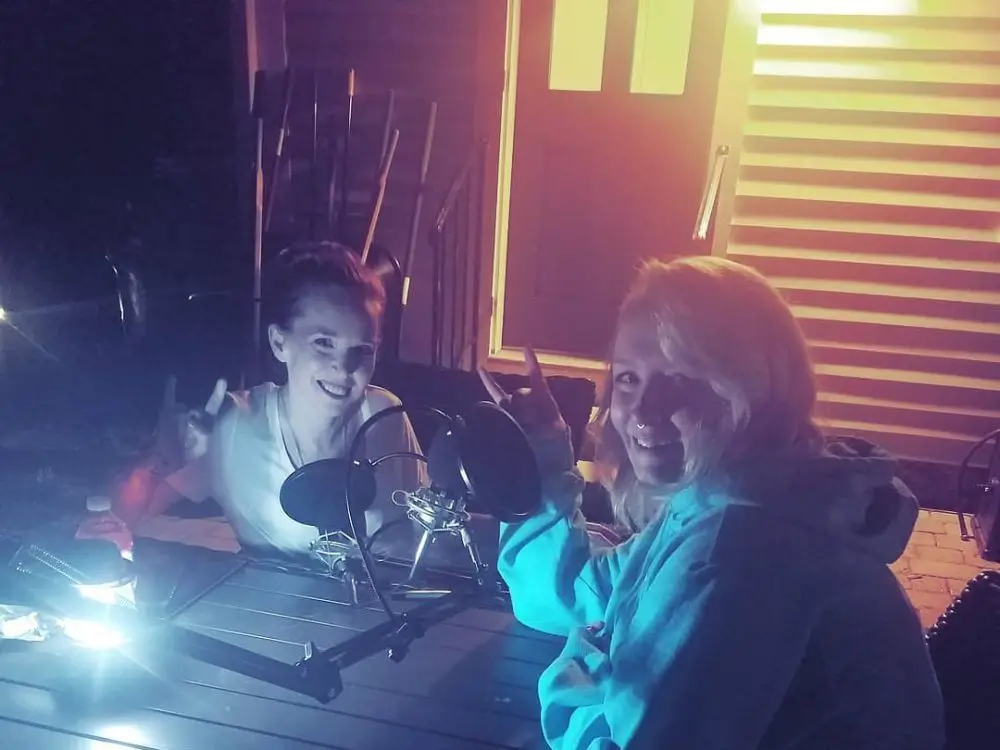“Heyyyy weirdos!”
Ash and Alaina start every episode of their true crime podcast, “Morbid: A True Crime Podcast,” with the phrase, greeting their fans and new listeners alike. “Weirdos” is an affectionate term for their fanbase, a group of people who enjoy listening to hours of terrifying stories about murder, abduction and serial killers.
Ash and Alaina have hosted “Morbid” together since May 2018, when they released their first episode, titled “Golden State Killer,” about the serial killer of the same name. Alaina is an autopsy technician and aspiring writer and Ash is a hairstylist. Though Alaina is 10 years older, Alaina’s parents raised the aunt-niece duo as sisters. Alaina always gravitated toward creepy and scary things and passed this passion on to Ash as they grew up together.
The podcast began as a fun outlet to explore their passion. “Together, we realized our collective knowledge of serial killers and morbid fascinations was something we could share with other kindred weirdos and thus, Morbid: A True Crime Podcast was born,” they wrote on their website. The community of “kindred weirdos” grew as the podcast progressed, leading to “Morbid” ranking No. 16 on the Spotify podcast charts and No. 34 on the Apple podcast charts.
The “lighthearted nightmare” that is “Morbid” blends true crime and comedy. These may seem like two genres that cannot, and perhaps should not, coexist in the same podcast; however, Ash and Alaina bring humor into true crime when appropriate.
Much of this comedy comes from mocking the people who perpetrate the crimes in their episodes. They’ve referred to John Leatham as “a piece of soggy lettuce scented like dehydrated asparagus pee,” Robert Ben Rhoades as a “human version of a clogged toilet” and Robert Bardo as “a horrific bag of poop on a hot summer day.” Their insults are creative, if not slightly crass or childish, and are solely aimed at the violent individuals they profile.
While they bring humor into the podcast, Ash and Alaina also ensure that they highlight a number of diverse cases. For example, they covered the barely known Corpsewood Manor case, in which two innocent gay men were murdered in their home in Georgia during the 1980s Satanic Panic. They have also covered the murders of Kendrick Johnson and Kenneka Jenkins, two separate unsolved cases involving Black teens whose mysterious deaths were ruled accidents after just limited investigations.
Ash and Alaina still cover the well-known true crime stories, like BTK, John Wayne Gacy and other prominent serial killers, but they make sure to bring coverage to other cases that are equally worthy of attention. Particularly, they often explore unsolved cases to help bring awareness to victims who have not yet obtained justice, such as the cases of Karina Holmer and Alissa Turney.
Ash and Alaina also know to tone down the humor depending on the episode. For example, the recently released Matthew Shepard episodes, which detail a horrific hate crime against an innocent gay man, were incredibly somber; both Ash and Alaina even broke down into tears. While some jokes may strike viewers as intense or slightly callous, Ash and Alaina try hard to keep “Morbid” sensitive and appropriate for their listeners.
While “Morbid” is about true crime, Ash and Alaina occasionally create episodes about other creepy content, like in the “Sleep Paralysis” and “Spooky Roads” episodes. More popularly, they have a series of “Listener Tales,” where they read aloud emails from listeners about their creepy or unsettling experiences. These episodes incorporate the audience into the podcast, allowing them to have their stories told and engage with the stories and life experiences of other listeners.
One concern about the world of true crime is the fear of glorifying violent criminals and serial killers, therefore inspiring others to kill to gain fame, like the murderer Luka Magnotta, subject of Netflix’s “Don’t F**k with Cats: Hunting an Internet Killer.” This docu-series detailed the story of Magnotta killing an innocent man, Jun Lin, because he wanted to become famous. The dangers of glorification are detailed in the podcast’s BTK episode, where they discuss how the fame seen by serial killer Dennis Rader emulated other famous serial killers like David “Son of Sam” Berkowitz. Despite evading capture for 30 years, Rader wrote antagonizing letters to the police due to his desire to gain recognition from his heinous crimes.
To address this concern, Ash and Alaina, in their episode on BTK, refer to him as “Dennis” in a deeply sarcastic tone instead of using his serial killer moniker, which he coined himself. In their episode about the Son of Sam, which was taped live from the Gramercy Theatre, they refer to him either sardonically as David or Son of Pearl — his mother’s name — to avoid calling him his chosen serial killer moniker.
While “Morbid” and other true crime-comedy podcasts have gained traction over the years, a question many have is: How ethical is the true crime genre? Is it ethical to tell the stories of those murdered? Is it ethical to bring humor into a genre rife with tragedy and loss? The answer is unclear.
While true crime podcasts may help bring attention to unsolved cases and cases of injustice to help educate listeners, there is still an ethical dilemma in telling the stories of solved murders. While some may find it interesting, it is undeniably painful to the families of the victims to be reminded of their living nightmare over and over. For the families of the victims of Ted Bundy, BTK or John Wayne Gacy, how must it feel to be reminded constantly by American culture about the loss of their child or relative?
While Ash and Alaina make sure to mock mercilessly the violent individuals they profile on “Morbid,” that might not be enough to make the podcast ethical if the genre it exists in is unethical. However, Ash and Alaina have taken steps to make their listeners aware of the moral dilemma and call attention to the feelings of the families of victims.
They hosted an episode with Jessica Clifton, the older sister of 11-year-old Maddie Clifton who was murdered by her 14-year-old casual friend Joshua Phillips. This episode shared the perspective of a family member of a murder victim, which is a rare point of view in the true crime genre. While this episode certainly helps with the issue of integrity in true crime as it pertains to “Morbid,” is it enough to make this podcast ethical? Only the listener can decide.

















